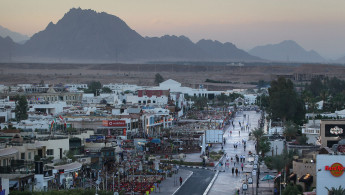Sinai residents suffer, a month into Egypt's military campaign
Sinai residents suffer, a month into Egypt's military campaign
Sinai residents are hungry, short of medicine and infant formula as Egypt's military campaign to oust an Islamic State group franchise drags on.
4 min read
Residents of Sinai are facing shortages of food and medicine (Getty)
Yaser Ahmed, 32, is tired of searching shops and pharmacies in the streets of Arish, north Sinai, seeking formula milk for his two-year-old son. The milk has not been allowed to enter the area due to the military operation launched by Egypt last month to oust a local franchise of the Islamic State group.
A resulting humanitarian crisis is affecting all aspects of life of Sinai. The area has generally suffered a shortage of food, vegetables and medicine since the military's campaign, but formula is in particular demand from the beleaguered residents, who are urging the Egyptian army to allow medicine and formula in as soon as possible.
"My child is allergic to many types of [cows'] milk so he needs formula. He needs one pack every ten days, but I try to stock up," said Ahmed, a teacher in the city of Arish.
He said supplies had been running low since the siege was imposed on the area in Febuary, leading him to embark on a daily search for formula.
"I even stopped searching for food," he said, referring to soaring food prices due to shortages. "It became by sole mission to find milk for my child. More than once, I stood in lines waiting, but to no avail."
There have been increasing appeals from citizens in Arish for aid, but so far the Egyptian state has not eased its restrictions.
"Some residents who have been able to return to al-Arish during the seige have smuggled medicine and formula with them," said a pharmacist, who wished to remain anonymous, in downtown Arish.
"The army's decision not to allow the entry of medicine and infant formula is unnecessary, and preventing these things has nothing to do with fighting terrorism, especially since the pharmacies in this area are registered with the Ministry of Health and operate in a legal manner," he added, demanding immediate action from the Egyptian government to end a worsening health crisis in the province.
The attacks from the Islamic State group continue, despite the ongoing military operation. What especially worries the residents of the Sinai is the absence of an end-date for the military operations which have been ongoing for a month, and threaten to give rise to a humanitarian crisis, affecting children in particular.
"Traders have promised government officials in the province that they will accept the required security measures, no matter how expensive, as long as they are ensured access to residents," said a food trader in the city of Al-Arish.
However, the Egyptian military is only permitting food to enter in quantities it deems appropriate, and only on pre-approved dates.
"The food that has been permitted to enter the area by the Egptian armed forces meets only a fraction of citizens' needs," the trader said, adding that almost no goods had been permitted to enter for the past few days.
He also criticised local officials for failing to maintain pressure on the government, and the army for maintaining to siege in the province.
The humanitarian situation is even more dire in East Sinai, where the cities of Rafah and Sheikh Zuwaid have been deemed closed military zones, completely isolated from the surrounding area.
Concerning communication with the Egyptian military, a source in the province's council said it was forbidden to even suggest introducing desperately needed aid to these areas.
Egypt has also launched a cyber warfare offensive on the region, which has caused widespread disruption to cellular networks as far as Israel and Gaza.
The latest offensive, an initiative of general-turned-president Abdel Fattah al-Sisi, comes in the run-up to the presidential elections, which the military strongman is almost certain to win after would-be opposition candidates were either arrested or withdrew their bids shortly after announcing them.
Egypt has for years been struggling to contain an insurgency concentrated in northern Sinai and spearheaded by a local affiliate of the Islamic State group.
Militant attacks have surged since the 2013 military overthrow of an elected Islamist president, and the violence has also spread to the mainland, with civilians often being caught in the middle.
The security campaign is targeting militants in the Sinai Peninsula as well as the Nile Delta and the Western Desert, including areas along the porous border with Libya.
A resulting humanitarian crisis is affecting all aspects of life of Sinai. The area has generally suffered a shortage of food, vegetables and medicine since the military's campaign, but formula is in particular demand from the beleaguered residents, who are urging the Egyptian army to allow medicine and formula in as soon as possible.
"My child is allergic to many types of [cows'] milk so he needs formula. He needs one pack every ten days, but I try to stock up," said Ahmed, a teacher in the city of Arish.
He said supplies had been running low since the siege was imposed on the area in Febuary, leading him to embark on a daily search for formula.
"I even stopped searching for food," he said, referring to soaring food prices due to shortages. "It became by sole mission to find milk for my child. More than once, I stood in lines waiting, but to no avail."
 |
The army's decision not to allow the entry of medicine and infant formula is unnecessary, and preventing these things has nothing to do with fighting terrorism |  |
There have been increasing appeals from citizens in Arish for aid, but so far the Egyptian state has not eased its restrictions.
"Some residents who have been able to return to al-Arish during the seige have smuggled medicine and formula with them," said a pharmacist, who wished to remain anonymous, in downtown Arish.
"The army's decision not to allow the entry of medicine and infant formula is unnecessary, and preventing these things has nothing to do with fighting terrorism, especially since the pharmacies in this area are registered with the Ministry of Health and operate in a legal manner," he added, demanding immediate action from the Egyptian government to end a worsening health crisis in the province.
The attacks from the Islamic State group continue, despite the ongoing military operation. What especially worries the residents of the Sinai is the absence of an end-date for the military operations which have been ongoing for a month, and threaten to give rise to a humanitarian crisis, affecting children in particular.
 |
|
| Full coverage of Egypt's 2018 election |
"Traders have promised government officials in the province that they will accept the required security measures, no matter how expensive, as long as they are ensured access to residents," said a food trader in the city of Al-Arish.
However, the Egyptian military is only permitting food to enter in quantities it deems appropriate, and only on pre-approved dates.
"The food that has been permitted to enter the area by the Egptian armed forces meets only a fraction of citizens' needs," the trader said, adding that almost no goods had been permitted to enter for the past few days.
He also criticised local officials for failing to maintain pressure on the government, and the army for maintaining to siege in the province.
The humanitarian situation is even more dire in East Sinai, where the cities of Rafah and Sheikh Zuwaid have been deemed closed military zones, completely isolated from the surrounding area.
 |
The food that has been permitted to enter the area by the Egptian armed forces meets only a fraction of citizens' needs |  |
Concerning communication with the Egyptian military, a source in the province's council said it was forbidden to even suggest introducing desperately needed aid to these areas.
Egypt has also launched a cyber warfare offensive on the region, which has caused widespread disruption to cellular networks as far as Israel and Gaza.
The latest offensive, an initiative of general-turned-president Abdel Fattah al-Sisi, comes in the run-up to the presidential elections, which the military strongman is almost certain to win after would-be opposition candidates were either arrested or withdrew their bids shortly after announcing them.
Egypt has for years been struggling to contain an insurgency concentrated in northern Sinai and spearheaded by a local affiliate of the Islamic State group.
Militant attacks have surged since the 2013 military overthrow of an elected Islamist president, and the violence has also spread to the mainland, with civilians often being caught in the middle.
The security campaign is targeting militants in the Sinai Peninsula as well as the Nile Delta and the Western Desert, including areas along the porous border with Libya.



